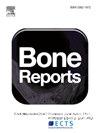Association of daily physical activity and bone microarchitecture in young adults with type 1 diabetes — A pilot exploratory study
IF 2.6
Q3 ENDOCRINOLOGY & METABOLISM
引用次数: 0
Abstract
Purpose
Physical activity (PA) is an important determinant of skeletal health. In young adults with type 1 diabetes (T1D) fracture risk is increased, yet few studies have examined the PA and bone health relationship. Therefore, this pilot cross-sectional study characterized PA levels and their association with bone parameters measured by high resolution peripheral quantitative computed tomography (HR-pQCT) in young adults with T1D.
Methods
HR-pQCT (Xtreme CTII) was used to measure bone outcomes at the distal tibia and radius, and accelerometery (ActiGraph GT3X) recorded daily minutes of light and moderate-vigorous physical activity (MVPA). Quadratic regression analyses were conducted with a p-value ≤ 0.05 considered significant.
Results
PA data from 19 young adults (23.1 ± 1.9 years) with T1D was analyzed. Over half (63 %) of participants completed ≥150 min of MVPA per week, however, most measured activity time per day (57 %) was spent in sedentary pursuits. Significant non-linear associations were found between the duration of MVPA and several trabecular bone parameters at the tibia.
Conclusions
In young adults with T1D, MVPA may have site specific (tibia) and compartment specific (trabecular) non-linear associations with bone. Further studies should confirm these findings, which may help inform evidence-based exercise recommendations to optimize bone health in young adults with T1D.
1 型糖尿病年轻成人的日常体育锻炼与骨骼微结构的关系--一项探索性试点研究
目的 体力活动(PA)是骨骼健康的重要决定因素。1 型糖尿病(T1D)患者骨折风险增加,但很少有研究探讨 PA 与骨骼健康的关系。因此,本试验性横断面研究对 T1D 患者的 PA 水平及其与通过高分辨率外周定量计算机断层扫描(HR-pQCT)测量的骨骼参数之间的关系进行了描述。HR-pQCT(Xtreme CTII)用于测量胫骨远端和桡骨的骨骼结果,加速度计(ActiGraph GT3X)用于记录每天轻度和中度剧烈运动(MVPA)的分钟数。结果 分析了 19 名患有 T1D 的年轻人(23.1 ± 1.9 岁)的运动数据。半数以上(63%)的参与者每周完成的 MVPA 时间≥150 分钟,然而,大多数测得的每日活动时间(57%)都花在了久坐不动的活动上。结论在患有 T1D 的年轻人中,MVPA 可能与骨骼有特定部位(胫骨)和特定区段(骨小梁)的非线性关系。进一步的研究应确认这些发现,这可能有助于为循证运动建议提供依据,从而优化 T1D 青壮年患者的骨骼健康。
本文章由计算机程序翻译,如有差异,请以英文原文为准。
求助全文
约1分钟内获得全文
求助全文
来源期刊

Bone Reports
Medicine-Orthopedics and Sports Medicine
CiteScore
4.30
自引率
4.00%
发文量
444
审稿时长
57 days
期刊介绍:
Bone Reports is an interdisciplinary forum for the rapid publication of Original Research Articles and Case Reports across basic, translational and clinical aspects of bone and mineral metabolism. The journal publishes papers that are scientifically sound, with the peer review process focused principally on verifying sound methodologies, and correct data analysis and interpretation. We welcome studies either replicating or failing to replicate a previous study, and null findings. We fulfil a critical and current need to enhance research by publishing reproducibility studies and null findings.
 求助内容:
求助内容: 应助结果提醒方式:
应助结果提醒方式:


